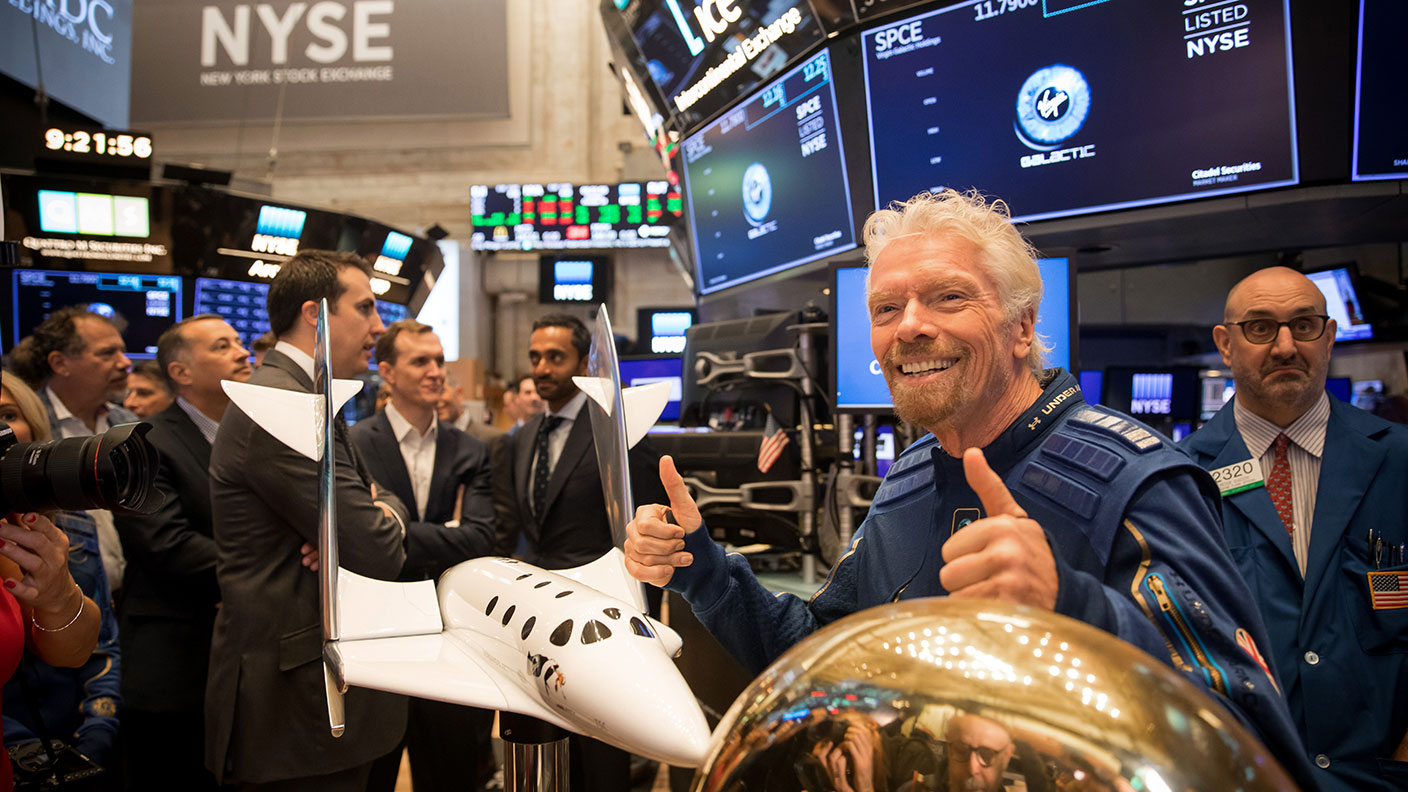Profit from the new space race
The US has opened up America's space exploration programme to private industry. And it's not only the US that's splashing out. Europe, Russia, China, Japan, India and the Middle East are all committing vast sums. Paul Hill examines the opportunities for investors.
Get the latest financial news, insights and expert analysis from our award-winning MoneyWeek team, to help you understand what really matters when it comes to your finances.
You are now subscribed
Your newsletter sign-up was successful
Want to add more newsletters?

Twice daily
MoneyWeek
Get the latest financial news, insights and expert analysis from our award-winning MoneyWeek team, to help you understand what really matters when it comes to your finances.

Four times a week
Look After My Bills
Sign up to our free money-saving newsletter, filled with the latest news and expert advice to help you find the best tips and deals for managing your bills. Start saving today!
President Obama recently threw open America's space programme to private companies announcing a 6% increase in NASA's five-year budget to $100bn. After years of keeping space travel the strict preserve of government, private space groups will now be encouraged to build and operate spacecraft of their own.
This is massive opportunity for us as investors. For the first time ever it will provide big business with the necessary funding, expertise and guaranteed work to transform the space industry in the same fashion as the airline sector took-off after the second world war.
Back then the military flew most planes, but private companies eventually started operating aircraft - especially when they got a guaranteed customer in the US government to deliver air mail. And that's what NASA would be: a cast-iron income stream, loaded up to the tune of $6bn to transport astronauts back and forth to the ISS.
MoneyWeek
Subscribe to MoneyWeek today and get your first six magazine issues absolutely FREE

Sign up to Money Morning
Don't miss the latest investment and personal finances news, market analysis, plus money-saving tips with our free twice-daily newsletter
Don't miss the latest investment and personal finances news, market analysis, plus money-saving tips with our free twice-daily newsletter
What's more it isn't just America splashing out big bucks on the industry. There is Russia, the European Space Agency, China (who have already conducted a space-walk), Japan, India and even the Middle East entering the fray. True, they may not yet rely on private enterprise, but this will come eventually as more space operations are outsourced rather than locked away behind government doors.
The start of a new Space Race
How long before you and I get to take a trip beyond the Earth's atmosphere? Well we will have a while to wait yet. As it stands, the Russian Space Agency is the only carrier providing transport, courtesy of spare seats. And neither is it exactly cheap, since the price for a flight brokered by Space Adventures to the ISS aboard a Soyuz spacecraft is around $20m$35m per trip. However this vast expense is coming down fast as technology improves and more competition comes on stream.
One early pioneer offering space flights is Virgin Galactic, whose SpaceShipTwo was unveiled in California in December by Richard Branson. The sleek, black and white 18-metre long vessel is capable of taking six passengers and two pilots for a brief trip above the atmosphere. About 13,000 people have already registered to pay a deposit and some want to pay the full $200,000 upfront to bag a place on one of the maiden flights. After blasting up high enough to achieve weightlessness, and see the curvature of the Earth, passengers will glide back down to Earth. Flights will take off from New Mexico, with Sweden and Abu Dhabi to follow.
Another leading buccaneer is Benson Space led by rocket entrepreneur Jim Benson. His spaceship is designed to hold up to six passengers along with the crew and will be based on the NASA shuttle model.
Aerospace giant Lockheed Martin also recently announced plans to supply an improved version of its Atlas V rocket to a space entrepreneur planning a privately operated, orbiting hotel to house intrepid adventurers. These industrial titans will race against each other to launch the first commercial space flights, in a rerun of the space race that caught the imagination of Americans and Russians during the Cold War.
And this not just about tourism. Virgin are betting that payloads of metal and silicone will be just as profitable as human cargo. The Virgin mother ship (the large spacecraft that carries the smaller rocket plane to about 15km before boosting it a further 95km into space) will also be capable of using ground-launched rockets to fire small scientific and commercial satellites into orbital space at a tenth of the cost of existing Nasa missions.
So how big is the opportunity?
Well according to The Space Report 2009, the worldwide industry was worth $257bn in 2008. This was split 67% commercial infrastructure and satellite services, with the rest being from government spending. In comparison, the entire UK space sector contributes £6.5bn to the domestic economy, supporting around 68,000 direct and indirect jobs. However I suspect in 40 years time, the global space industry will be whole lot bigger.
And with the recent discovery of water on Mars and the moon, there is now a very real chance that these planets could be used as staging posts for bolder missions out into the wider universe..
How to cash in
Ok how can we profit from space travel?
Well the leading private companies include aerospace giants Boeing and Lockheed Martin. Boeing is the prime contractor for the ISS - which was developed in a partnership among the US, Russia, Japan, Canada, and the European Space Agency - whilst Lockheed Martin is another of NASA's largest and longstanding contractors.
Although I like both of these quality businesses, I believe there are better options in smaller and pure-play providers. One is SpaceX (the shares are not publicly listed though), which already has its Falcon rocket and Dragon capsule, and others include Bigelow Aerospace and Sierra Nevada (SpaceDev subsidiary). Bigelow is another firm developing a commercial space hotel.
Get the latest financial news, insights and expert analysis from our award-winning MoneyWeek team, to help you understand what really matters when it comes to your finances.
Paul gained a degree in electrical engineering and went on to qualify as a chartered management accountant. He has extensive corporate finance and investment experience and is a member of the Securities Institute.
Over the past 16 years Paul has held top-level financial management and M&A roles for blue-chip companies such as O2, GKN and Unilever. He is now director of his own capital investment and consultancy firm, PMH Capital Limited.
Paul is an expert at analysing companies in new, fast-growing markets, and is an extremely shrewd stock-picker.
-
 Should you buy an active ETF?
Should you buy an active ETF?ETFs are often mischaracterised as passive products, but they can be a convenient way to add active management to your portfolio
-
 Power up your pension before 5 April – easy ways to save before the tax year end
Power up your pension before 5 April – easy ways to save before the tax year endWith the end of the tax year looming, pension savers currently have a window to review and maximise what’s going into their retirement funds – we look at how
-
 Invest in space: the final frontier for investors
Invest in space: the final frontier for investorsCover Story Matthew Partridge takes a look at how to invest in space, and explores the top stocks to buy to build exposure to this rapidly expanding sector.
-
Three space stocks for adventurous investors
Tips Micah Walter-Range, index creator for the world’s first space ETF, selects three of his favourite space stocks to buy now.
-
 The space race: exciting, but not necessarily profitable
The space race: exciting, but not necessarily profitableOpinion The new space race will spawn a host of new companies wanting to cash in. But investors should tread very carefully, says Merryn Somerset Webb: most will fail.
-
 A new investment trust to profit from the space race
A new investment trust to profit from the space raceTips There is now an investment trust focusing on the space sector. It looks intriguing, says David Stevenson – but highly risky.
-
 Reach for the stars: how to profit from a new era of space exploration
Reach for the stars: how to profit from a new era of space explorationCover Story It has been almost 50 years since someone walked on the Moon and Mars seemed just a short hop away. But now the final frontier is back in fashion, spelling opportunity in a wide range of sectors, says Ben Judge.
-
Space exploration is booming – now’s the time to back it
Opinion Will space exploration be the next boom industry? Perhaps, says Matthew Lynn. And now is the time to buy in.
-
 Visionary investors should place their bets in the space race
Visionary investors should place their bets in the space raceCover Story It’s not just eccentric and ultra-rich tycoons heading into space. From asteroid mining to space hotels, promising profit opportunities now lie off-planet. Set your sights on the stars, says Stephen Connolly.
-
Is there life on Mars? Maybe not – but there’s money in space
Features With news of running water on Mars, people are excited about space exploration again. That's good for the global space industry – and for those who invest in it.